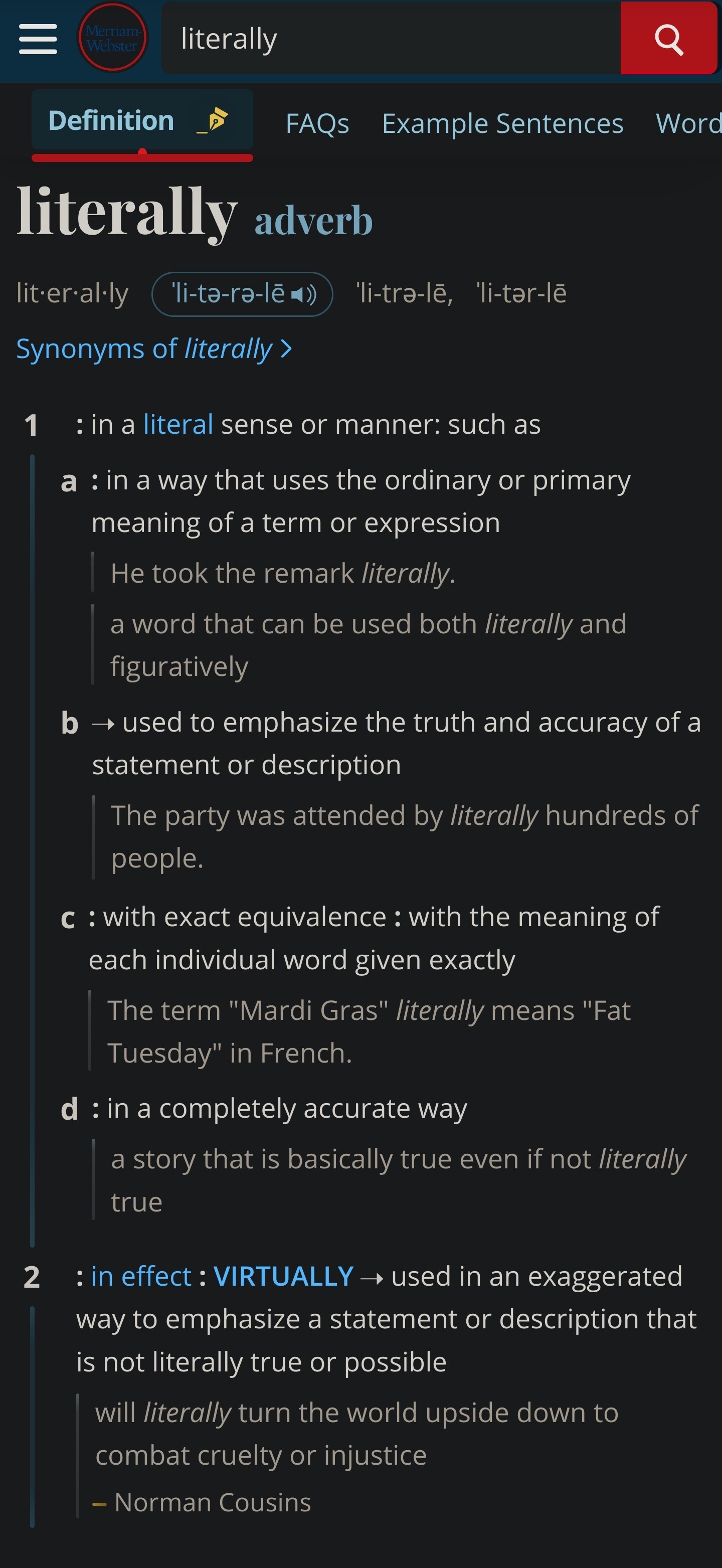Farther is the correct word, and has been confused with further for so long (over a hundred years), that they both mean exactly the same thing nowadays, so not sure why people are taking issues with it.
Merriam Webster is a descriptive dictionary. They don’t tell you how words “should” be used, they say how words are used.
Using literally as an intensifier goes back literal centuries. The earliest written citation we’ve found of that usage goes back to 1769. It can be found everywhere from Dickens to Brontë.
It’s also hardly the first word to go on a similar path towards becoming an intensifier. Very originally meant “genuine”, really meant “in fact”, absolutely meant “completely”, etc.
But who complains about sentences like “I was really bored to death”, or “I was absolutely rooted to the ground”? Does saying “it’s very cold” just mean “it is a genuine fact that it is cold”?
Literally still means what it means. You can’t use literally to mean “yellow”, for example. People aren’t generally confused when they come across the word.
Language is a complex and nuanced subject, but it often helps to remember that “all words are made up.”
Idioms and hyperbole are both used extensively in language to imbue feeling to statements, most people would roll their eyes at someone who interjects with a “there’s no actual evidence that boredom can be lethal” or a “I highly doubt that vendor would accept human limbs as payment,” but somehow lots of people stan for “literal” snobbery.
If it makes you feel any better, you can think of it as a homophone from the same root: “in a manner related to literature,” speaking to artistic yet inexact use of words in a sentence.
Also… I’m all for the language evolving and words changing their meaning over time, as they’ve always done, but that one is crazy. Hopefully common use will, in time, fix that and get that new definition changed… but ehh, I don’t hold much hope.
Bring on the AI overlords? Reading the Polity (Sci Fi) series at the moment, and it really doesn’t seem like a bad option!
The title correcting it to further is what caught my attention, but no, I’m not seeing people taking huge issue with it either.
And there’s nothing wrong with being correct, I like to be eloquent too.
I was just saying farther is just as correct as further, and found it interesting is all. They may have been misused a hundred years ago, but not for a long long time, they have identical meanings nowadays!
Farther is the correct word, and has been confused with further for so long (over a hundred years), that they both mean exactly the same thing nowadays, so not sure why people are taking issues with it.
Unless I’m missing something?
I don’t see any comments of people taking issue with it. But words do mean things, and some people like to speak with precision.
Words apparently don’t mean things anymore, Merriam Webster added a new definition for “literally” this year
Merriam Webster is a descriptive dictionary. They don’t tell you how words “should” be used, they say how words are used.
Using literally as an intensifier goes back literal centuries. The earliest written citation we’ve found of that usage goes back to 1769. It can be found everywhere from Dickens to Brontë.
It’s also hardly the first word to go on a similar path towards becoming an intensifier. Very originally meant “genuine”, really meant “in fact”, absolutely meant “completely”, etc.
But who complains about sentences like “I was really bored to death”, or “I was absolutely rooted to the ground”? Does saying “it’s very cold” just mean “it is a genuine fact that it is cold”?
Literally still means what it means. You can’t use literally to mean “yellow”, for example. People aren’t generally confused when they come across the word.
Language is a complex and nuanced subject, but it often helps to remember that “all words are made up.”
Idioms and hyperbole are both used extensively in language to imbue feeling to statements, most people would roll their eyes at someone who interjects with a “there’s no actual evidence that boredom can be lethal” or a “I highly doubt that vendor would accept human limbs as payment,” but somehow lots of people stan for “literal” snobbery.
If it makes you feel any better, you can think of it as a homophone from the same root: “in a manner related to literature,” speaking to artistic yet inexact use of words in a sentence.
Also… I’m all for the language evolving and words changing their meaning over time, as they’ve always done, but that one is crazy. Hopefully common use will, in time, fix that and get that new definition changed… but ehh, I don’t hold much hope.
Bring on the AI overlords? Reading the Polity (Sci Fi) series at the moment, and it really doesn’t seem like a bad option!
I’m just going to assume they meant that sarcastically.
They also added a new definition for “very” to mean something other than, “factually”, or, “verifiably”.
The title correcting it to further is what caught my attention, but no, I’m not seeing people taking huge issue with it either.
And there’s nothing wrong with being correct, I like to be eloquent too.
I was just saying farther is just as correct as further, and found it interesting is all. They may have been misused a hundred years ago, but not for a long long time, they have identical meanings nowadays!
Finding Forrester